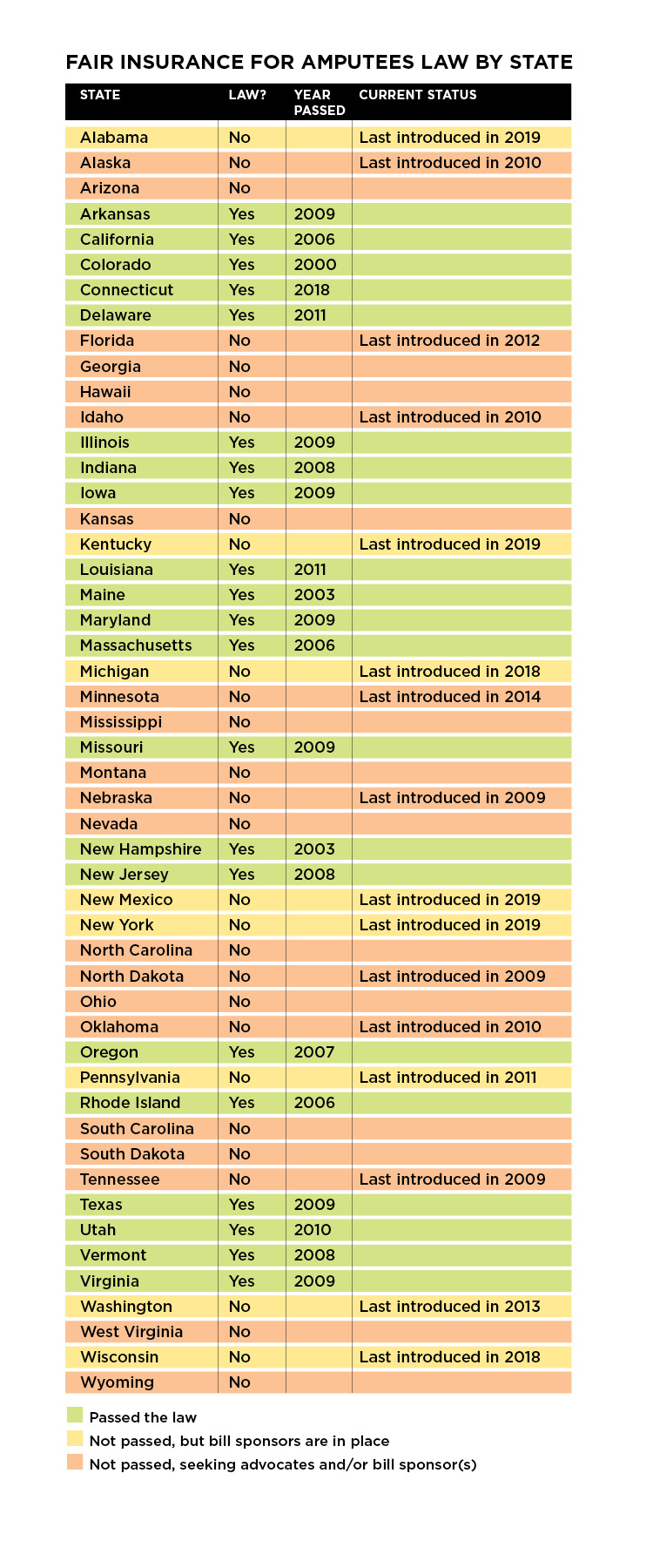Momentum is building for a new wave of progress toward equitable insurance policies for amputees. Here’s how you can help.

Twenty years ago this month, Colorado became the first state to mandate fair and reasonable insurance coverage for prosthetic devices. Known colloquially as the Prosthetic Parity Act, the Colorado law required private health insurers to offer coverage at the same level as Medicare: 80 percent coverage with no lifetime benefit cap. By eliminating policies that restricted coverage to amounts far below the actual cost of prosthetic devices, Colorado’s law made prostheses accessible to thousands of people who previously couldn’t afford them. Subsequent studies showed that prosthetic parity improved long-term health outcomes and reduced healthcare costs—a win-win-win.
Between 2000 and 2011 another 19 states passed prosthetic parity laws, thanks mainly to the Amputee Coalition‘s tireless organizing and advocacy. Some states followed Colorado’s model, requiring insurers to adhere to Medicare standards. Others took a slightly different tack, mandating that coverage for prostheses can’t be more restrictive than coverage for comparable health services. Congress introduced a series of bipartisan Fair Insurance for Amputees bills, and a federal law appeared within reach.
But the battle over the Affordable Care Act (ACA), aka Obamacare, derailed the momentum for insurance fairness for amputees.
“The ACA sucked all the air out of the room,” says Dr. Jeffrey Cain, a bilateral amputee and one of the activists who championed the Colorado law 20 years ago. “Democrats and Republicans got so confrontational over health care that it became impossible to move legislation.”
It’s been slow going ever since. Only one state (Connecticut) has enacted a fair insurance for amputees law in the last eight years. But Cain—now the Amputee Coalition’s board chair—thinks the time may be right for a reboot of the Fair Insurance campaign. The Amputee Coalition has invested considerable time and effort to help generate new energy. And the key driver behind that effort will be the voices of individual amputees whose lives and livelihoods are disrupted because they lack access to prosthetic devices.
“In 2017 we launched the Amplify project,” says Cain, referring to an initiative that collects stories from amputees who’ve battled in vain to secure coverage for prosthetic care. “And in 2019 we created our Lead Advocate training program to give people the tools and skills to work on legislation at the state and federal levels.”
As Cain points out, Fair Insurance for Amputees has strong appeal for legislators from both parties. The laws enacted to date have drawn support from Democrats and Republicans alike.
“Amputation is an equal-opportunity disability,” says Cain. “Members from both parties have constituents who are impacted. And you can make a strong case for fair insurance to legislators across the political spectrum. There’s a strong economic case for it, there’s a strong ethical case, and there’s a strong moral case.”
With most state legislatures currently out of session and Congress in a holding pattern until after the 2020 election, it’s not likely any action will be taken the rest of this year. But Cain views this summer as an ideal time to lay the groundwork for a big push in 2021.
“This is like preseason training,” he says. “It’s where you build your team. You gather the right stories, you pull together data, and you learn how the legislature in your state works. People from Congress usually spend time in their districts over the summer, so it’s an opportunity to get on their calendar and educate them about the issue.”
There’s more to this complex issue, including a federal law (ERISA, or the Employee Retirement Income Security Act of 1974) that clashes with state law in some states. The Amputee Coalition’s website has detailed info about Fair Insurance laws in each state, as well as the status of the campaign at the federal level.
For a quick glance at where things stand in your state, check the table below. Keep in mind that, in some states that already have Fair Insurance laws (such as Virginia), advocates are pushing to strengthen their legislation, so you can make a difference no matter where you live. A quick guide to the chart:
* Green indicates that a Fair Insurance law is in place.
* Yellow denotes states that have legislative sponsors for active Fair Insurance bills, but still need citizen advocates to work toward a legislative majority to pass a bill.
* Red signifies that a state is seeking both citizen advocates and champions in the legislature.





